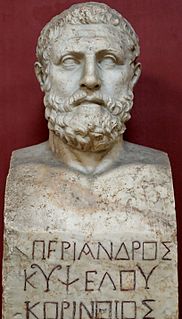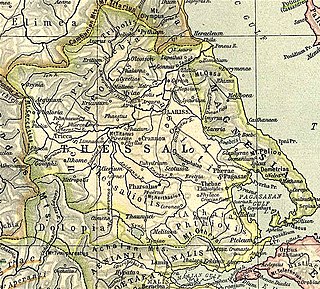Alexander was tagus or despot of Pherae in Thessaly, and ruled from 369 to c. 356 BC. Following the assassination of the tyrant Jason of Pherae, in 370 BC, his brother Polydorus ruled for a year, but he was then poisoned by another brother, Alexander. Alexander governed tyrannically and was constantly seeking to control Thessaly and the kingdom of Macedonia. He also engaged in piratical raids on Attica. Alexander was murdered by the brothers of his wife, Thebe, as it was said that she lived in fear of her husband and hated Alexander's cruel and brutal character.

Arion was a kitharode in ancient Greece, a Dionysiac poet credited with inventing the dithyramb: "As a literary composition for chorus dithyramb was the creation of Arion of Corinth," The islanders of Lesbos claimed him as their native son, but Arion found a patron in Periander, tyrant of Corinth. Although notable for his musical inventions, Arion is chiefly remembered for the fantastic myth of his kidnapping by pirates and miraculous rescue by dolphins, a folktale motif.
In Greek mythology, Pheres, son of Cretheus and Tyro and brother of Aeson and Amythaon, was the founder of Pherae in Thessaly. He fled there from Iolcus after his half-brother, Pelias, seized the throne. He married Periclymene, daughter of Minyas, and became the father of Admetus, Lycurgus, Eidomene, Periopis and Antigona. Of them Admetus was the husband of the famous Alcestis, who died in his stead and was rescued by Heracles, while Pheres, despite his old age, would not do the same for his son.

Periander, was the Second Tyrant of the Cypselid dynasty that ruled over Corinth. Periander’s rule brought about a prosperous time in Corinth’s history, as his administrative skill made Corinth one of the wealthiest city states in Greece. Several accounts state that Periander was a cruel and harsh ruler, but others claim that he was a fair and just king who worked to ensure that the distribution of wealth in Corinth was more or less even. He is often considered one of the Seven Sages of Greece, men of the 6th century BC who were renowned for centuries for their wisdom.
Cypselus was the first tyrant of Corinth in the 7th century BC.

Pherae was a city and polis (city-state) in southeastern Ancient Thessaly. One of the oldest Thessalian cities it was located in the southeast corner of Pelasgiotis. According to Strabo, it was near Lake Boebeïs 90 stadia from Pagasae, its harbor on the Gulf of Pagasae. The site is in the modern community of Velestino.
Callias was an ancient Athenian aristocrat and political figure. He was the son of Hipponicus and the daughter of Megacles, an Alcmaeonid and the third member of one of the most distinguished Athenian families to bear the name of Callias. He was regarded as infamous for his extravagance and profligacy.
Lycophron was a sophist of Ancient Greece.
The Thessalian League was a loose confederacy of feudal-like city-states and tribes in the Thessalian plain in Greece. The seat of the Thessalian diet was Larissa.

Corinth was a city-state (polis) on the Isthmus of Corinth, the narrow stretch of land that joins the Peloponnese to the mainland of Greece, roughly halfway between Athens and Sparta. The modern city of Corinth is located approximately 5 kilometres (3.1 mi) northeast of the ancient ruins. Since 1896, systematic archaeological investigations of the Corinth Excavations by the American School of Classical Studies at Athens have revealed large parts of the ancient city, and recent excavations conducted by the Greek Ministry of Culture have brought to light important new facets of antiquity.
Moschion, was an Athenian tragic poet. Nothing is known about his life; he probably lived in the second half of the 3rd century BC. Three titles and a few fragments of his plays are preserved by Stobaeus. He wrote a Telephus, and two historical plays: Themistocles, of which we have a three line fragment, and the Men of Pherae (Pheraioi), which dealt with the death of Jason, the cruel tyrant of Pherae. Also extant are 33 lines of a speech from an anonymous play which deals with the history of human progress. In this fragment, he states that humans originally lived like animals, without houses or technology, law was absent, and cannibalism was rife. In the course of time, agriculture, cooking, wine, houses, and cities were introduced, civilisation was born, and people buried their dead so that people would not be reminded of their earlier cannibalism.
Onomarchus was general of the Phocians in the Third Sacred War, brother of Philomelus and son of Theotimus. After his brother's death he became commander of the Phocians and pursued a warmongering policy until his final defeat.

Thessaly or Thessalia was one of the traditional regions of Ancient Greece. During the Mycenaean period, Thessaly was known as Aeolia, a name that continued to be used for one of the major tribes of Greece, the Aeolians, and their dialect of Greek, Aeolic.

Korkyra was an ancient Greek city on the island of Corfu in the Ionian sea, adjacent to Epirus. It was a colony of Corinth, founded in the archaic period. According to Thucydides, the earliest recorded naval battle took place between Korkyra and Corinth, roughly 260 years before he was writing - and thus in the middle of the seventh century BC. He also writes that Korkyra was one of the three great naval powers in fifth century BC Greece, along with Athens and Corinth.

Timophanes was an Ancient Corinthian and brother of the renowned Greek statesman and general Timoleon. During the 360s BC, the city-state of Corinth found herself in an unfamiliar and radically changing world. In the forty plus years since the end of the Peloponesian War, the political power houses of the eastern Mediterranean had changed fairly drastically. The city-states of Athens, Sparta and Thebes had each contended to become the political and military leaders of Hellas. This, in conjunction with interference from the Achaemenid Empire in the form of the so-called King’s Peace, dictated by Artaxerxes II, and the rise of Jason of Pherae had created an unprecedented complex political environment on the Greek peninsula.
In Greek mythology, Chrysopeleia was a Hamadryad nymph.






